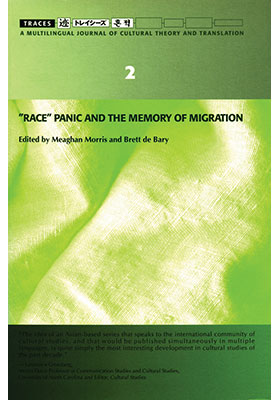Race Panic and the Memory of Migration (Traces 2)
(種族恐慌與移民記憶)
ISBN : 978-962-209-562-5
Traces: A Multilingual Series of Cultural Theory and Translation
November 2001
432 pages, 6″ x 9″
Also Available on
The second volume of the Traces series, “Race” Panic and the Memory of Migration, explores complex relations between violence, historical memory, and the production of “ethnicity” and “race.” Some essays analyze the panicked “othering” that has led to violence against Chinese Indonesians, and to the little-known massacres of Hui Muslims in nineteenth century China and of Cheju Islanders in Korea in 1948. Others examine the fraught discourses surrounding colonialism, immigration, citizenship, and nation-building in Australia, Taiwan, Japan, the United States, and Ireland. What new modes of inscribing experience might counter prejudice against migrant subjectivities? How can one articulate links between diverse subaltern struggles around the global movement of capital? Can shared memories of domination provide the basis for a cosmopolitanism more attentive to local identities?
Contributors: Ien ANG, Victor KOSCHMANN, Rey CHOW, Luke GIBBONS, Yann Moulier BOUTANG, HUANG Ping, JUNG Yeong-hae, Tessa MORRIS-SUZUKI, KOMAGOME Takeshi, KIM Seong-nae, Jacqueline ARMIJO, Ghassan HAGE, SAKIYAMA Masaki, TOMOTARI Mikako, MORI Yoshitaka, OKA Mari
“The idea of an Asian-based series that speaks to the international community of cultural studies, and that would be published simultaneously in multiple languages, is quite simply the most interesting development in cultural studies of the past decade.” —Lawrence Grossberg, Morris Davis Professor of Communication Studies and Cultural Studies, University of North Carolina and Editor, Cultural Studies
“This is one of the most radical and ingenious responses that I have seen to the hegemony of English-mediated theory and Western-derived analysis of modernity and multiculturalism, rendering prominent keywords and discussions on related topics either highly problematic, or making them pale into insignificance. It challenges some of the most insidious elements of colonialism and post-colonialism—languaging—without any of the familiar nationalist or subalternist heroism.” —Ariel Heryanto, Melbourne Institute of Asian Languages and Societies, The University of Melbourne
“This second volume of Traces will have a similar transforming and unsettling effect on our understanding of ‘race’ and ‘migration’ as its first volume had on our understanding of the cultural politics of ‘translation.’ The essays assembled here are poignant and provocative: they interrogate memories of ambivalence and abjection; they document the struggle of displacement and solidarity; and, they invariably map the trail of panic and violence that so often accompanies the global circuits of migration.” —Dilip Gaonkar, Northwestern University and Executive Editor, Public Culture
“As the East–West binarism has been internalized predominantly in cultural spheres since the end of the Cold War, the task of examining the modes of global hegemony has never been more urgently needed. In response to such a call, Traces was inaugurated. This multilingual series provides a fertile ground where one may expect new intellectual paradigms to emerge among different vocabularies, different modes of thinking, and different languages of Europe, the Americas, and Asia. The birth of a new paradigm is extremely difficult and rare, but Traces has already accomplished a few important steps along this path.” —Sun Ge, Chinese Academy of Social Sciences, Beijing


